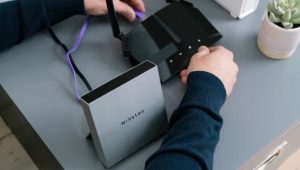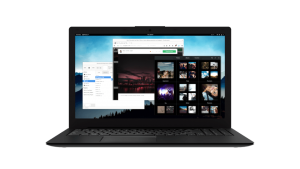Privacy is trending up. Yay!
It’s becoming stylish. Oh….
It’s becoming pricey. Arrgghh.
What may be considered a basic right for citizens is fast becoming an expensive commercial commodity, available to consumers at a price. Privacy protections for our personal information and security services for our online social interactions are weak in a legislative or regulatory sense, and self-policing policies by major technology providers are failing.
That opens up an opportunity for the market to fill in the gaps.
From annual anti-virus software updates to subscription-based, privacy-centric browsing experiences to fee-for-service virtual private networks (VPNs), more and more privacy and security offerings are available in the consumer marketplace.
Now, dedicated hardware products are upping the ante and providing physical, device-based protection for your online identity and personal data.
For example, the new Winston Privacy device is a dedicated hardware solution that you install between your home (or office) modem and personal computer.
The device is packed, the developer describes, with both hardware and software scrambling and encrypting tools designed to protect browsing experiences from unwanted tracking, interference or outright theft by hackers, spies, corporations or governments.
Spec-wise, Winston touts its dual-core, 1 GHz 64-bit Marvel Armada processor supported by 1 GB of 800 MHz DDR4 memory.

The new Winston Privacy device is a dedicated hardware solution packed, the developer describes, with scrambling and encrypting tools to protect browsing experiences from unwanted tracking, interference or outright theft. Image: Winston Privacy
Not only is the device internally capable, it is externally stylish. The brushed aluminum outer case sits flat or stands upright thanks to its clever curved kickstand. So good looks are a key part of this corporately-described “premium product”.
“While technology has given way to important advancements in our society, the hard reality is we now live in a surveillance economy where everyone’s personal information – from their Amazon cart or Spotify playlist to specific locations they visit in their hometown – is for sale,” Richard Stokes, founder and CEO of Winston Privacy, also said at the product’s roll-out. “You unknowingly give away a frightening amount of personal information anytime you open an internet browser. We’re proud to unveil Winston at CES, which uses deep back-end technology to power a simple consumer-facing privacy device, to solve this problem.”
One way Winston protects online browsing and identity is by scrambling Internet activity through a constantly shifting, decentralized network built on Ethereum.
The device also detects and blocks so-called fingerprinting techniques that can detect and leverage manufactured differences among otherwise identical browser, mobile or computer set-ups. Fingerprints can be used to identify who and where you are, even if you’re blocking cookies or browsing in incognito mode.
Unlike VPNs, which encrypt (and often log) Internet activity through a central point, Winston builds a peer-to-peer distributed network among its users. That network, built on the open source Ethereum blockchain platform, constantly (every ten seconds, it’s reported) and randomly shifts website domain requests, anonymizing the user’s computer and blocking third-party cookies from identifying its location.

The Winston device provides protection for every connected device running at the network level, including computers, phones, tablets and smart home devices. Image: Winston Privacy
Not only is privacy protected, Winston says its ability to filter or block tracking requests and related third-party advertising content means a faster, cleaner browsing experience for users.
According to Winston, and based on beta tests and early user reports, its peer-to-peer approach shows an 81 percent reduction in cookies, 44 percent reduction in data usage by devices running on the user’s home network, and a 47 percent average reduction in page load time when compared to a centralized VPN service strategy.
The Winston device provides protection for every connected device running at the network level, including computers, phones, tablets and smart home devices. The company also provides automatic software updates so users always have the latest security and privacy protection.
So all this protection comes at a price, of course.
Winston is coming out through a Kickstarter crowdfunding process (orders are to be filled in the U.S. and Canada first) with pre-orders, special offers, upsells and other terms of services available.
Winston device pre-orders start around $250 (USD), and the device comes with a free, one-year service subscription (including anti-tracking and anti-malware protection, encrypted DNS, unlimited cloaked bandwidth and software updates). After that first year, the Winston subscription is about $8.25 a month or $99 a year.
The company described the choices about that price structure on its blog, saying it had to “make a decision … to offer a cheaper product while cutting corners with privacy (i.e.: doing shady back end data or whitelisting deals) or if we were going to be completely transparent and respect our users’ privacy with a zero-knowledge platform.
“The reality is that it’s virtually impossible to build and support hardware (especially GREAT hardware, which we strive for) without an ongoing revenue stream. That supports engineers, updates, support and all of the other costs of running the business.
“We’ve made some decisions already but we’re still figuring out precisely what come with the device and what comes with the subscription. We think that the security benefits should be free… we all know how many security holes that cheap modems and routers have, so even if you don’t continue to subscribe, Winston will continue to act as an extra layer of defense for all your home devices.”
So even if a user drops the monthly service subscription, the Winston privacy device will still function, but without the automatic software updates.

The stylish personal server from Helm promises Internet privacy and protection for a price. Image: Helm
At almost twice the price, the stylish personal server from Helm ($500, currently only available in the U.S.) promises Internet privacy and protection for personal online assets like emails, images and other digital property. Helm, too, has an additional fee-for-service subscription component to its privacy offering. The Helm Personal Server automatically establishes a connection with the Helm gateway service, and a static IP address and network configuration lets users run a their own email server from home.
Then, there’s the privacy services and stylish laptop computer series from Purism. It offers a suite of its own online services called Librem One that includes VPN connectivity, secure email, chat services and more. Monthly fees are as low as $2 per month, depending on the range, type and amount of service usage.

Souped-up security-protecting laptops like Purism’s Librem 15 are priced around $1,500 (USD), depending on configuration. Image: Purism
But more to the point is the company’s computer offerings: Its laptops are built, the company describes, using dedicated hardware components selected specifically for their privacy-protection capabilities, and they run on a dedicated operating system developed for maximum privacy protection. The company says it blocks or disables known hardware backdoors completely, adding that its laptops include physical kill switches for camera and microphone connections.
Souped-up security-protecting laptops like Purism’s Librem 15 are priced around $1,500 – with options for physical configuration, selected accessories and subscription services.
There is a way, Winston’s development team has blogged, for us to “reclaim our online privacy and use the [I]nternet without being watched, packaged, and sold”. Certainly, that company and other privacy practitioners are not alone in warning us that our “every online move is being tracked by big tech companies, advertisers, data brokers, governments and more”.
Until new regulations and stronger legislation come into effect with the power to protect all our online moves and penalize those who track them illegally or inappropriately, there’s a real risk that privacy solutions will become a luxury item, putting a basic right out of the reach of many of us.
-30-



